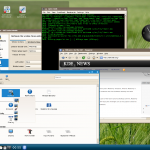KDE 4.3.1 on Sun Ray
Saturday, September 5th, 2009The Sun Ray thin client is a nifty piece of hardware, especially when it’s painted with a KDE Oxygen logo. It’s a thin client with USB forwarding and sound and session management and smartcard support (but it does not support the FSFE’s Fellowship smartcard). You can put the roughly the same thing together with Free Software, starting with LTSP, but I’ve been a fan of this largely-hardware solution for years. Unfortunately, it has been a poor platform for KDE4 — I’ve blogged about this in the past.
Until now.
 There’s new Sun Ray server 5 coming up, and one of the features it has is Xrender (finally!). You need to enable it after installation and there are warnings about performance, but with a small deployment things should be just fine. I deployed it on my desk, with a single DTU with a single 1280×1024 monitor attached, running on an amd64 X2 with 6GB of RAM. Crunchy, but then again I was also building KDEtoys and KDEpim in parallel on it alongside a local GNOME session and a KDE 4.3.1 session on the Sun Ray.
There’s new Sun Ray server 5 coming up, and one of the features it has is Xrender (finally!). You need to enable it after installation and there are warnings about performance, but with a small deployment things should be just fine. I deployed it on my desk, with a single DTU with a single 1280×1024 monitor attached, running on an amd64 X2 with 6GB of RAM. Crunchy, but then again I was also building KDEtoys and KDEpim in parallel on it alongside a local GNOME session and a KDE 4.3.1 session on the Sun Ray.
Wait, 4.3.1? Wasn’t it just yesterday that I posted about the availability of KDE 4.3.0 on OpenSolaris? Yes, true. Bumping KDE up one minor revision did not take all that long, although I had to bump Akonadi to 1.2.0 in the process.
We use the gstreamer backend for Phonon on OpenSolaris, because gstreamer is installed anyway — or maybe it’s the Sun native audio backend? I don’t know and I don’t even know how to check. Suffice to say that whatever the default build picked out, sound works. Now, that might not be all that impressive at first thought, but that means that the thin client is receiving whatever audio output KDE is generating. I have not tried Amarok yet (that port needs a little more work still) on OpenSolaris, but that offers new realms of network-transparent desktop use.
The performance work done in Plasma over the past release cycle(s) has been impressive, and it just feels much snappier; Plasmoid handles show up like they should. This is a world of difference with my old laptop and KDE 4.1 which I was not-exactly-showing-off in London last year. Kudos to the Plasma team (and I’m truly looking forward to the results of Tokamak 3). The screenshot here is KDE 4.3.1 running on a Sun Ray, with whatever theme and decoration I ended up with while fiddling around (although Fluffy Bunny is listed in the “Get themes” widget, it doesn’t seem to work). There is a rendering issue with the text in systemsettings, where white-on-white isn’t all that useful, but on the whole it seems to work well enough graphically. A quick test using qgears gets 20fps on the Sun Ray, versus 30fps on the local display of the same machine (Radeon X1200).
There are some functional bugs, though. Many applications do not start up from the K menu, although they do start from the command line (and they do start up if I log in on a local display instead of the Sun Ray). Konqueror takes forever and a day to start or respond to keypresses — this is not production ready, but it is debug-ready, for anyone with a DTrace hammer. There’s a good chance, actually, that the issues are all related to threading problems deep within the C++ libraries. I know there are some newer patches available for it, and I think the library has been fully integrated into Solaris Nevada as of this week (presumably with those patches), which will make our own packaging of those C++ libraries superfluous. Hunting these issues down and integrating some feature work for OpenSolaris will be the KDE4-OpenSolaris team’s focus for the coming release cycle. It’s coming closer.